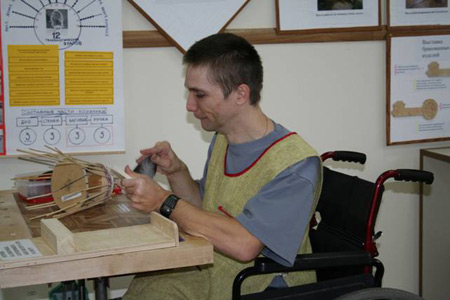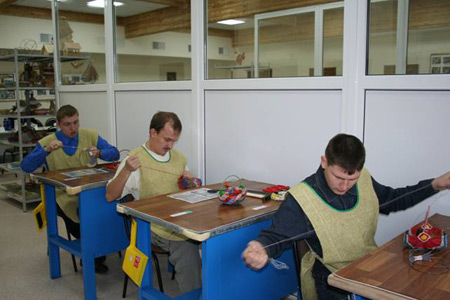

Volume:3, Issue: 1
Mar. 1, 2011


Mar. 1, 2011
DESCRIPTORS: students with disabilities, young adults, psycho-neurological pathologies, craft training, work team formation, at-home work opportunities, self-esteem development.
SYNOPSIS: The concept of training limited abilities students in tasks that will help them make their way in the world while also developing their self-esteem and confidence is explored. In Russia, this model provides an option until the government takes the necessary steps to create a more sophisticated approach to the education and vocational training of persons with limited abilities of a psycho-neurological nature.
***
Up to the 1990s in Russia, services for people with limited abilities were provided in specific, boarding-type facilities. When a newborn showed severe developmental disabilities, the parents were strongly recommended to leave the child permanently in state-run facilities – boarding schools (called internats in Russia) for disabled children and later in psycho-neurological nursing homes. These patients lived and were educated in closed facilities thereby becoming totally dissocialized. For decades, the educational and socialization environments were more secluded and differed from the normal, national, social reality.
Nowadays, some countries pursue a modern educational policy of breaking up welfare institutions into smaller units. They offer neighborhood-based services for children with limited abilities. Parents demand special facilities where their grown children will obtain services that meet their age, psychological, and emotional needs.
Hypothetically, the existing state-run system of educational services in Russia does not object to integration of limited ability children into mainstream schools and the regular social environment. However, the federal laws which regulate this process are rather vague. As a result, such integration into society is not seen as compulsory. Moreover, the law does not provide resources, primarily financial and labor funding, to implement these integration processes. The necessary social conditions have not been created either.
In the face of this situation, parents have to act as human rights advocates in order to ensure an accessible education for their children including those over 18. Such parents sometimes unite and initiate new ways to exercise their children’s rights for education and social competency development. Some parent associations have solved purely pragmatic problems. Others have worked out guidelines which have become well-known in Russia and serve as a base for developing integration processes. Against this background, the state has not yet created a satisfactory, public system of comprehensive, neighborhood-based service packages for people with limited abilities. Russia is still in the phase of experimental research to develop a multistage system of education, integration, and socialization of limited abilities children, teenagers, and young people.
Among the most common problems of families with “special” children living in small towns is the lack of opportunity for special education in their town after the children reach the age of 18. For a variety of reasons, such facilities are usually thought to be economically unfeasible. One reason seems to be the lack of qualified staff with experience in dealing with diverse disabilities groups. Another is that a sustainable, educational environment catering to the needs of each learner requires significant, additional funding. Another perception is that only a small percentage of graduates in such schools will be able to find jobs on the free market. Consequently, special school graduates are unlikely to utilize the vocational skills obtained in school.

In this context, the city of Kurchatov located in the Kursk Region of Russia initiated a practical experiment in unorthodox education: limited abilities learners (aged 18 and older) with psycho-neurological pathologies were educated (without granting a formal certificate) utilizing special needs techniques. Students learned traditional Russian folk skills in special, craft workshops that produce articles made of beads, willow, wood, clay, fabric, wire, and other materials. Unlike regular arts and craft facilities, this new process of education did not attempt to follow old canons. More sophisticated but traditional processes were impossible to implement due to the limited abilities of the learners. However, the students’ articles (perhaps, in the eyes of some, not of high artistic value) are presented for sale at exhibitions, charity fairs, or presentations and usually get a very positive response from the public. Here, we undoubtedly see a great benefit both for the community in exercising its open-mindedness and for the learners in shaping their self-esteem and self-awareness.

Upon completion of student training, the workshops may form workshop teams headed by the teachers of the various skills. Some graduates may even be ready to continue craft projects in their individual homes. In this case, the leadership functions are shared by the teacher and a family member.
This format of labor training (without granting a formal certificate) has been in effect and successful for the past five years. We have received a positive response from the limited abilities students themselves, from their relatives, from their neighbors, and from local officials. This program of courses was awarded a prize at the Russian Federation Civic Chamber competition entitled “What is Best for Children.”
Until the country adopts a national program of neighborhood based education for limited abilities people with psycho-neurological pathologies, we humbly suggest that our model be tried by special education institutions.
1 Maslova, Zhanna V. - Vice Head, Rehabilitation Center for Children and Young Adults with Limited Abilities, Kurchatov, Kursk Region, Russia.

Home | Copyright © 2026, Russian-American Education Forum